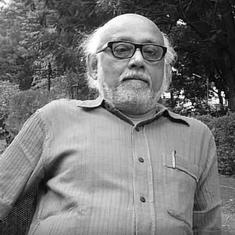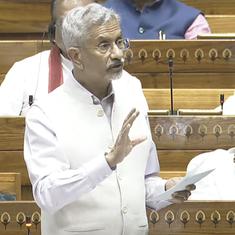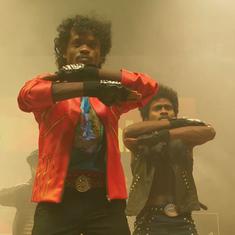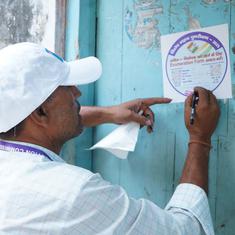Having unseated the Congress government in Arunachal Pradesh for the second time this year, the Bharatiya Janata Party is making moves to take another northeastern state, Manipur, which goes to polls early next year.
BJP president Amit Shah kickstarted his party’s campaign in the state earlier this month while senior leader Himanta Biswa Sarma – the Congress rebel who fashioned the saffron party’s massive victory in Assam in May – has been entrusted with the task of delivering a “Congress-mukt” North East.
The northeastern states have traditionally been Congress strongholds, but Shah believes that after the formation of the first BJP government in Assam, the people of this region are looking at the party as a viable and credible alternative.
The BJP did not win any seat in the last Assembly elections in Manipur in 2012, but won two constituencies in last year’s bypolls. But it is feeling particularly emboldened after it made inroads in the recent Imphal Municipal Council elections, winning as many as 10 of the 27 seats. The party had won only one seat in the 2011 civic polls.
This development has not gone unnoticed by the Congress, which is currently in power in Manipur with 48 MLAs in the 60-member Assembly. “This is definitely a cause for concern… the result shows that the BJP has made its presence felt in the urban areas,” remarked a senior Congress office-bearer.
And as in the case of Arunachal Pradesh, the Congress has been virtually reduced to a helpless bystander as the BJP spreads its footprint through the aggressive use of money power and by pushing its Hindutva agenda. The fact that the Congress has been in power for three terms in Manipur has made its task doubly difficult.
Wooing the Meiteis
The BJP is banking heavily on the support of the Meiteis, the majority community in Manipur with a strong presence in 40 of the state's 60 Assembly seats. The Meiteis have been influenced by the Hindutva agenda of the Rashtriya Swayamsevak Sangh, which has been working in Manipur for several years. However, it is only now that the BJP has struck roots in this northeastern state, which has also been home to an active Ramakrishna Mission.
The BJP is scouting around for strong Meitei candidates and is said to be in touch with several Congress legislators and ministers who are expected to jump ship once the elections are announced.
At the same time, the Narendra Modi government is going slow on the implementation of the Naga peace accord it signed with the Nagaland insurgent group Nationalist Socialist Council of Nagaland-Isak Muivah last year. Although negotiations on its implementation have been in progress over the past year, the Centre is holding back on a key element in the accord – the integration of Naga-populated areas in other northeastern states, including Assam, Manipur and Arunachal Pradesh, for the formation of Greater Nagaland.
The Centre realises that changing the physical boundaries of the concerned states is not easily achieved as this move is met with strong resistance from the other northeastern states. Any forward movement on this aspect of the peace accord will have repercussions in poll-bound Manipur as the majority Meiteis bristle at the suggestion that the Naga-dominated areas of their state be hived off. Such a move will not only alienate the Meiteis but also result in escalating tensions between the majority community and the Nagas, who have always been on a collision course on territorial issues.
While keeping the Meiteis in good humour, the BJP is also working with the Nagas in the state despite the fact that they follow the Christian faith. It is touting the Naga accord to win their support and has enlisted the help of the Naga People’s Front, which is in power in Nagaland and has substantial influence over the Nagas in Manipur.
“On one hand, the BJP is wooing the Meiteis by playing the Hindu card. And on the other, it is reaching out to the Nagas through the NPF,” remarked a senior Congress office-bearer involved with the northeastern states.
He said that the Naga-dominated areas, which account for 20 assembly seats, are controlled by insurgent groups that ensure only candidates of their choice can contest elections. “This again puts the BJP in an advantageous position,” the Congress leader added.
After it lost Arunachal Pradesh for the second time, the Congress appears to have resigned itself to losing power in Manipur. “What can we do?… We are up against the BJP ideology,” said a Congress leader.
Money power
And then, there is the lure of money. Most northeastern states tend to go along with the government in power at the Centre and its promise of special funds.
According to CP Joshi, the Congress general secretary in charge of the North East, this is exactly what transpired in Arunachal Pradesh. Even after the Supreme Court restored the Congress government in July, the new Congress chief minister, Pema Khandu, was in constant touch with the BJP leadership. Joshi said party legislators who had earlier defected returned to the Congress fold only to escape the anti-defection law, as they would have lost their assembly membership if they had voted out the Congress government in a confidence vote. It was, therefore, only a matter of time before Khandu walked out with 43 of the 44 MLAs and joined the People’s Party of Arunachal Pradesh, which is supported by the BJP and is a member of the North East Democratic Alliance – a front formed by the BJP to spread its wings in the North East.
Having been beaten at the game, the Congress is now drawing solace from the fact that the defected MLAs preferred to form a regional party instead of joining the BJP. A Congress leader was at pains to explain that Amit Shah and Himanta Biswa Sarma tried to persuade Khandu and his band of legislators to join the BJP but to little avail. “This is actually a loss of face for the BJP, though it is trying to project it as its victory,” the Congress leader said.










